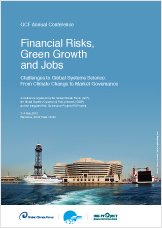Financial Risks, Green Growth and Jobs
May 3-4, 2012
World Trade Centre, Barcelona, Spain

Challenges to Global Systems Science:
From Climate Change to Market Governance
The conference is organised by:
Global Systems Dynamics and Policy (GSDP)
Global Climate Forum (GCF)
Integrated Risk Governance Project (IRGP)
Outline
The global financial crisis has posed an additional challenge to the governance of global systems. While the economic progress in many emerging economies is continuing, debt-laden countries, especially in Southern Europe, feel stuck in a global financial system outside their control. Populations are facing mass unemployment and public unrest is rising. There is also a notable reaction within the western economies against a perceived unfair distribution of wealth and the fact that global environmental risks are left unattended.
Challenges are multi-faceted and need a comprehensive response. A green growth strategy offers the opportunity to turn sufficient amounts of financial capital into entrepreneurial investment. Transforming the cities, businesses and homes so as to increase welfare while reducing damages to the environment is widely seen as a desirable goal and can trigger the investments needed to create global growth.
There is a lack of global markets governance, but there is also a lack of global systems science. In particular e-Science and advanced Information and Communication Technologies (ICT) can help in showing the links between various global systems, in fostering global learning communities and awareness, and developing new methodologies and decision support systems for global governance. More accurate models about how the economy really works in the context of global change are also urgently required.
Global coordination requires new systemic perspectives in science, and the development of models and evidence-based policy appraisals that span the whole range of scales and domains from local regional to global multi-national decision-making. A new generation of models must allow a global system assessment of policy options taking into account the implications of policies across all sectors and nations. The multidimensionality of global problems and the interconnectedness of decisions across different policy sectors have to be reflected in a multidisciplinary system approach to modelling involving political scientists, economists, philosophers and psychologists. At the same time, ICT opens a vast range of opportunities for public engagement in a dialogue, and new venues for political participation. Researchers, policy makers and new global communities have to critically reflect upon and become engaged in the role of ICT in changing core practices in science, daily life and in global governance, and work on the possibilities that ICT offers to global social-ecological systems understanding and renewal.
Our two-day conference intents to steer in-depth conversations to help understanding these challenges and design robust strategies to deal with them. The conference is structured through four plenary sessions and three working break-out group sessions. The break-out groups topics will be decided during the conference so as to integrate participants’ input. The discussions in the groups should take stock of key insights as well as controversial issues of the considered topic. The results will be presented and discussed in plenary sessions.
